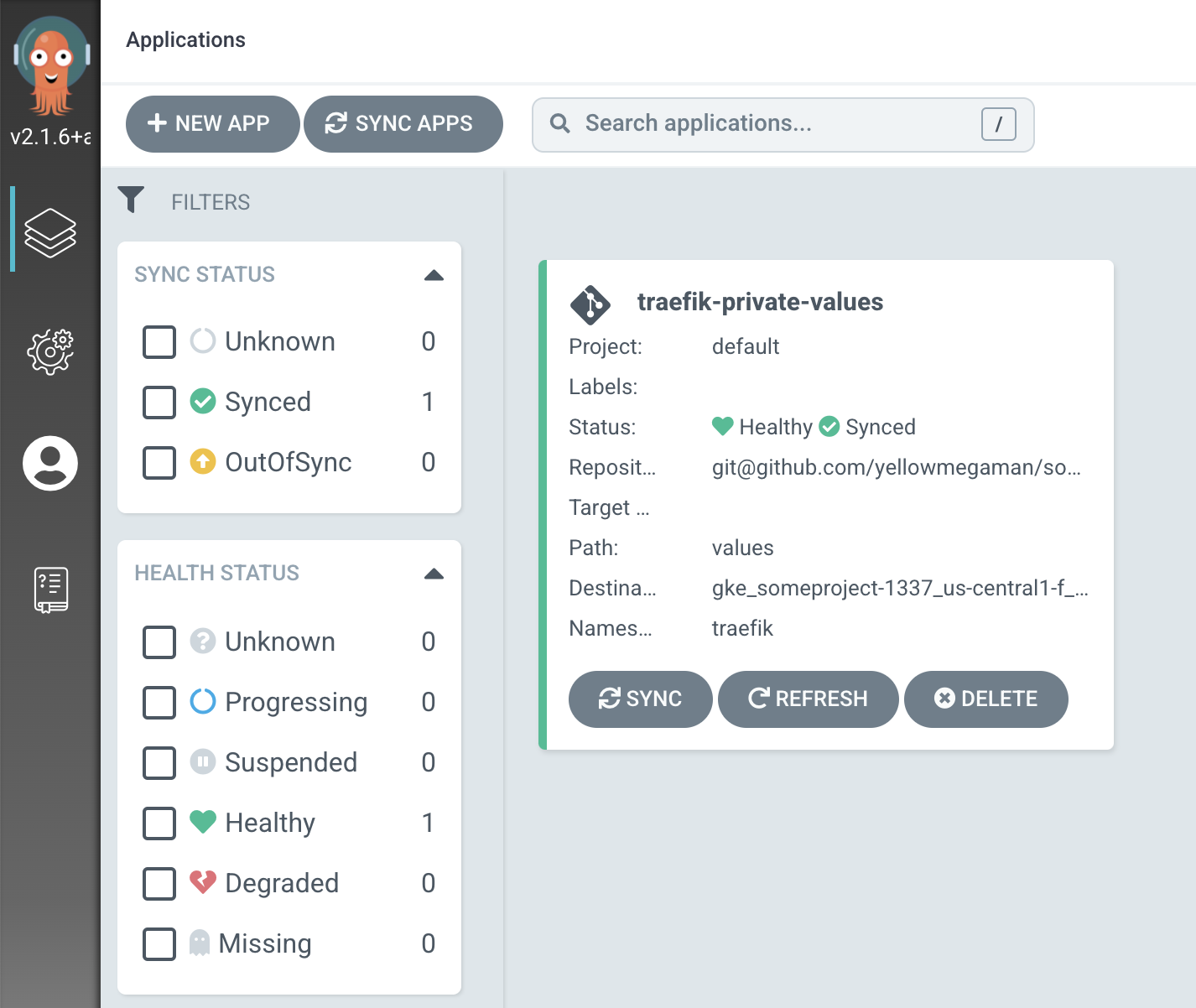Using ArgoCD for proper GitOps is great. You define your workload, put it in VCS, point ArgoCD to it with proper credentials and you’re good. But there is a case, when you’re not the one developing some piece of software, but you do want to store it’s configuration privately.
We’re talking about public helm charts. Copying public chart to your repo is not something you would love to do and it will bring lot of hassle – you will end up in situation when chart was updated by creators, and you need to sync or update.
But configuration is sensitive data, so you want to keep it private. This is some part of functionality not yet covered by ArgoCD itself, because you can’t specify public repo and private repo for values.yaml at the same time.
Thankfully ArgoCD is extendable with plugins.
Traefik plugin configuration and credentials
First things first, we need to create ArgoCD plugin and add it to our installation
This is the configuration block for both our private repo with values.yaml and plugin:
---
apiVersion: v1
kind: ConfigMap
metadata:
name: argocd-cm
namespace: argocd
data:
repositories: |
- url: git@github.com:yellowmegaman/somerepo
sshPrivateKeySecret:
name: some-repo-key
key: sshPrivateKey
configManagementPlugins: |
- name: helm-resolver
init:
command: [bash, -c]
args: ["helm repo add $REPO_NAME $REPO_URL && helm repo update"]
generate:
command: [bash, -c]
args: ["helm template --include-crds -n $ARGOCD_APP_NAMESPACE $COMMAND $ARGOCD_APP_NAME $REPO_NAME/$CHART_NAME --version $CHART_VERSION"]
Add ssh private key to kubernetes secret:
kubectl -n argocd create secret generic some-repo-key \\
--from-file=sshPrivateKey=$HOME/.ssh/id_ed25519
Application configuration
In yellowmegaman/somerepo repo we have a folder values with file traefik-values.yaml with following contents:
deployment:
kind: DaemonSet
additionalArguments:
- "--api=true"
- "--api.insecure=true"
- "--accesslog=true"
- "--providers.kubernetesIngress.ingressClass=traefik-cert-manager"
We want to use it with official Traefik helm chart.
Let’s verify the installation:

Define application using helm-resolver plugin in app.yaml:
---
apiVersion: argoproj.io/v1alpha1
kind: Application
metadata:
name: traefik-private-values
namespace: argocd
spec:
destination:
namespace: traefik
server: <https://555.555.555.555>
project: default
syncPolicy:
automated:
prune: true
selfHeal: true
syncOptions:
- Validate=true
- CreateNamespace=true
source:
path: values
plugin:
env:
- name: REPO_NAME
value: "traefik"
- name: REPO_URL
value: "<https://helm.traefik.io/traefik>"
- name: CHART_NAME
value: "traefik"
- name: CHART_VERSION
value: "10.6.2"
- name: COMMAND
value: "--values traefik-values.yaml"
name: helm-resolver
repoURL: git@github.com/yellowmegaman/somerepo
Apply application to local cluster:
kubectl -n argocd apply -f app.yaml
Verify installation in ArgoCD:

One of the main changes to the configuration in our traefik-values.yaml files was about changing deployment type to DaemonSet, let’s verify that this change was included in the deployment:
k -n traefik get ds
$ k -n traefik get ds
NAME DESIRED CURRENT READY UP-TO-DATE AVAILABLE NODE SELECTOR AGE
traefik-private-values 1 1 1 1 1 <none> 2m38s
Conclusion
Now that we have everything in place, we can change official chart version or our privately stored values to trigger an update. Woot!
